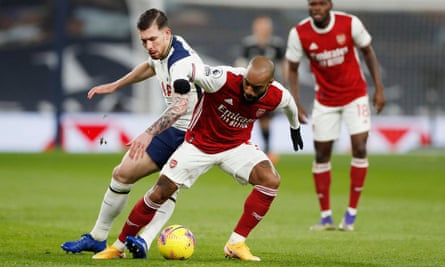It is perfectly normal for a manager to protect his players after a high-profile defeat and Mikel Arteta was happy enough to leave himself open after Arsenal were held off comfortably by Spurs. “In terms of performance they did everything I asked them to do, absolutely everything,” he said. “We played in a way that I believe we had to play this game.”
Arteta knows perfectly well that half of the players who passed, passed, crossed, rinsed and repeated for long periods of the north London derby have no place in a functioning, progressive Arsenal side. But it is his job to get the best out of the resources available and, since the summer’s tactical triumphs at Wembley, he has fallen short. Arsenal find themselves needing a win over Burnley on Sunday, and preferably some shoots of progress beyond that, to breathe anything resembling fresh life into their season and it is hard to see how repeating their approach of recent weeks will bear fruit.
Arsenal delivered 44 crosses against Spurs, 32 of them from open play. To be clear, there is nothing wrong with that as long as the purpose is obvious. Two of them even produced decent chances, Pierre-Emerick Aubameyang heading over a Kieran Tierney delivery that deserved better and Alexandre Lacazette’s effort requiring a scrambling save from Hugo Lloris. Otherwise it was little more than heading, slashing and hacking practice for the home defence; if Arteta really believed that was the right approach against the Premier League’s tightest back line then the evidence says he got it wrong.
“If we generate that every week, we will win football matches for sure,” Arteta said. Perhaps he will hope James Tarkowski and Ben Mee, the Burnley centre-backs, are out of practice given they only faced 19 crosses when Everton visited Turf Moor on Saturday. Arteta has hung a lot on probability in the past week, saying in the wake of a similar night’s frustrations against Wolves that “pure maths” suggested the goals would start flowing if Arsenal continued to pack the box.
Can Arsenal’s current resources make the numbers stack up? Only three of Aubameyang’s goals since joining in 2018 have been scored with his head, although he had a slightly better record on that front with Borussia Dortmund. He is hardly a safe bet when attacking balls from wide and it is difficult to see who else fits that bracket. Even taking into account Arteta’s reminder that crosses can be drilled, not just lofted, the runs into the box that might exploit them are not coming. Arsenal’s central midfielders are yet to muster a Premier League goal this season.

The answer is, of course, to settle on an approach that privileges other means of creativity. Arteta selected Lacazette in a variant of the No 10 position at Spurs and, albeit unintentionally, it gave the impression of a cry for help. Lacazette had run amok from that berth during a freewheeling night’s football against an inadequate Rapid Vienna on Thursday. His link-up play in deep areas has generally been better than he is given credit for so the idea was not outlandish; he worked hard at Tottenham and showed enough mettle to suggest a grim run of personal form may yet be surmounted.
In practice, though, Lacazette was on a hiding to nothing and received little change from the customarily excellent Pierre-Emile Højbjerg. He is neither deft, quick-thinking nor smooth enough a ball carrier to be a top-level No 10 and those are not intended as criticisms. Lacazette was simply a square peg in a round hole and had the effect of showing exactly where Arteta’s biggest issues lies: Arsenal have a passable amount of quality in wide areas but sorely lack the player who change a game’s complexion from infield. There were suggestions Willian could make an impact in that position but he has largely been preferred out wide and shown precious little to suggest that, at 32, he was worth an expensive three-year contract.
Arteta will seek to wheel and deal more effectively in January in an effort to turn a glacially-moving tanker the way he wishes. It will be a test for a relatively inexperienced leadership team that comprises Arteta, the technical director Edu and the chief executive, Vinai Venkatesham. They extracted the cash for Thomas Partey from the Kroenkes in September but a combination of speed, expertise and sound decision making will be required to navigate a window Arteta admits will be “unpredictable”.
Giving Arteta the benefit of the doubt, it could be posited that he is far from blind to Arsenal’s shortcomings but has been off-beam in choosing the ways to patch over them. There comes a point, although he is not there yet, where that wears thin: Arsenal cannot simply be a club that muddles through between transfer windows in the hope of a silver bullet that never quite materialises. It is time for a clear strategy to emerge and no weight of possession statistics, or after-match explanation, offers persuasion that one was evident on Sunday.
Should Arsenal not find a way through, or indeed around, Burnley on Sunday their worst start to a season in 39 years will deteriorate further. “We are letting the fans down,” their centre-back Rob Holding said of that statistic. Arteta must find a formula that lifts the cloud and lightens the stodge before panic buttons begin to flash.
Source link